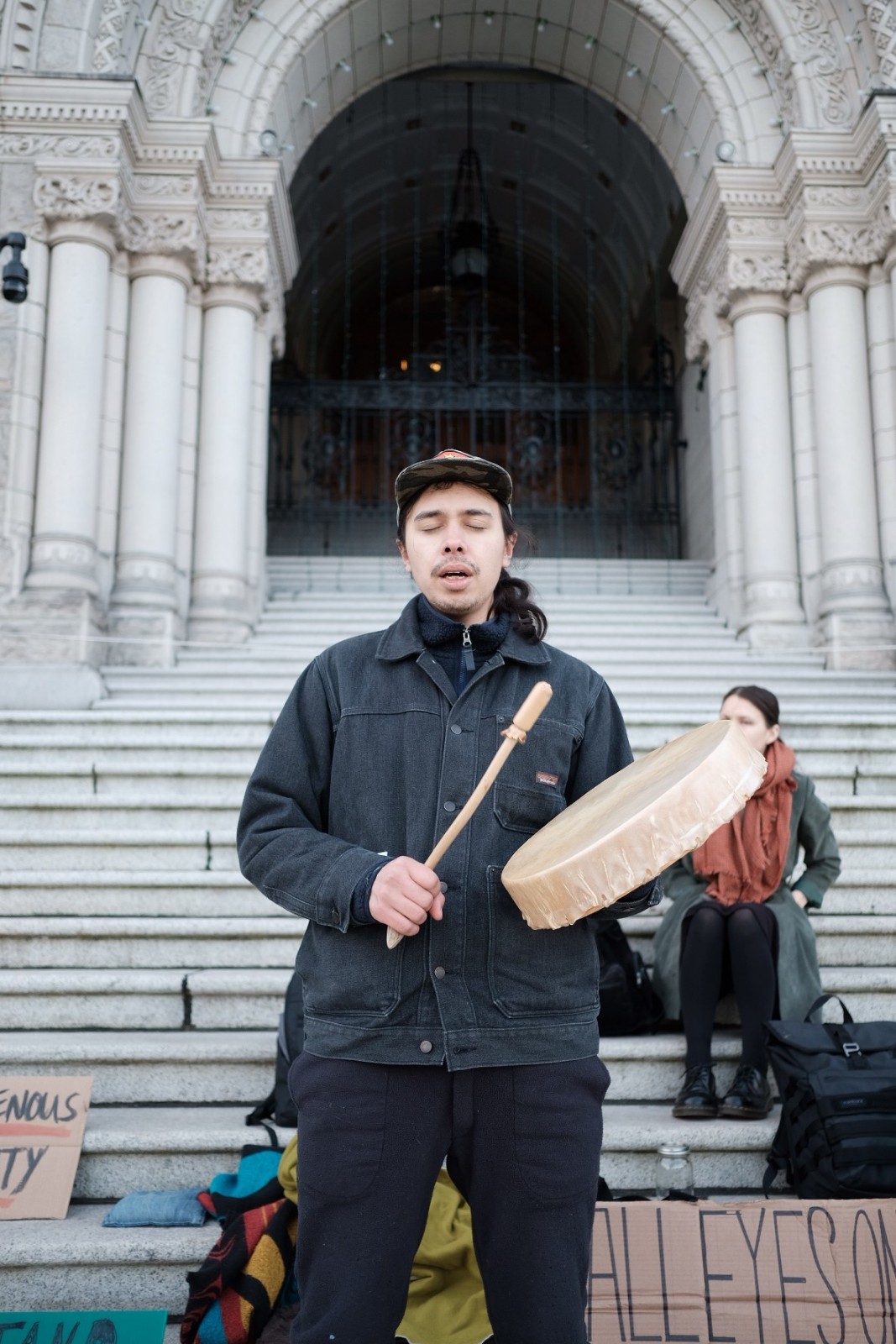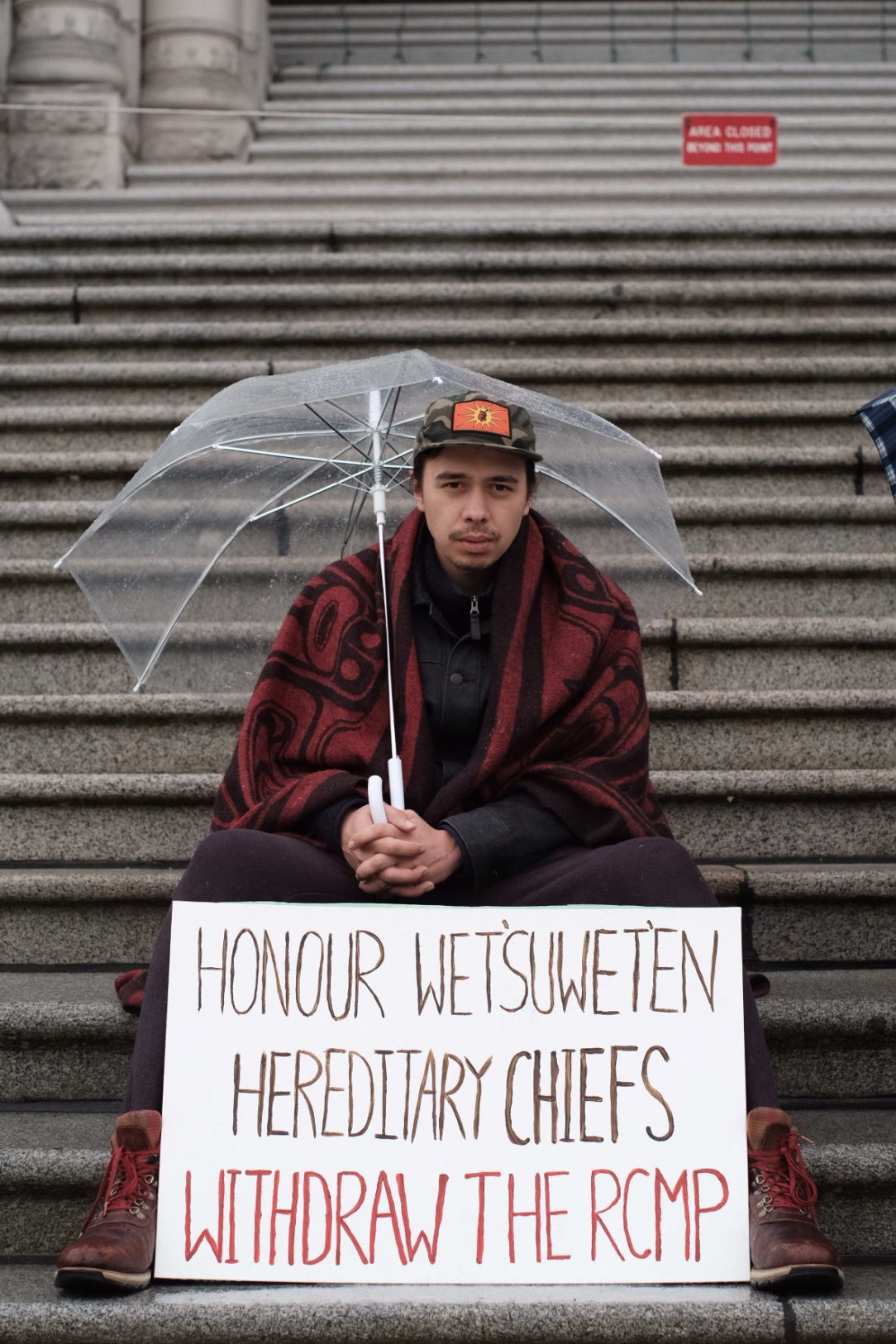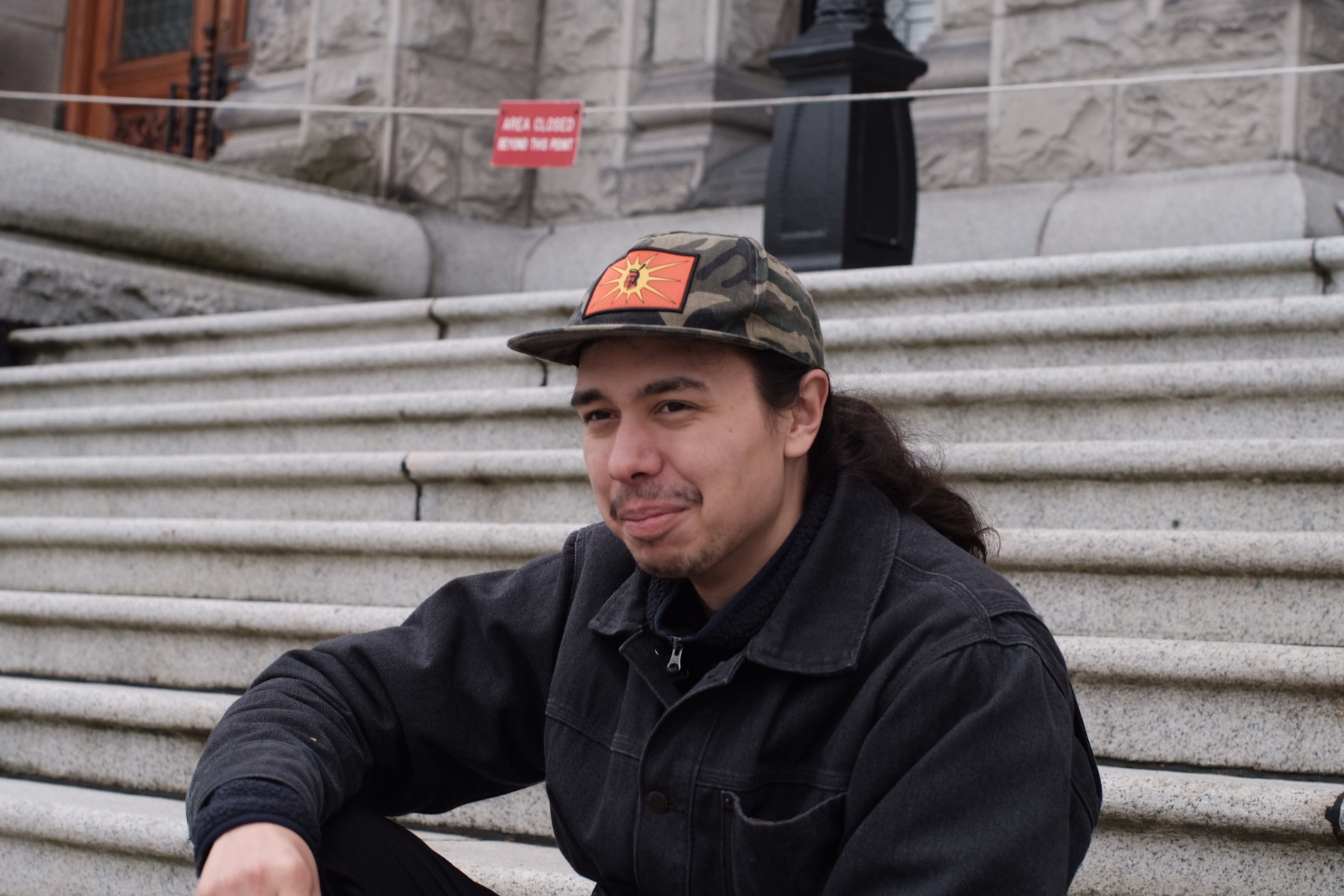UVic student’s week-long protest draws attention to movement against pipeline project in northwestern B.C.
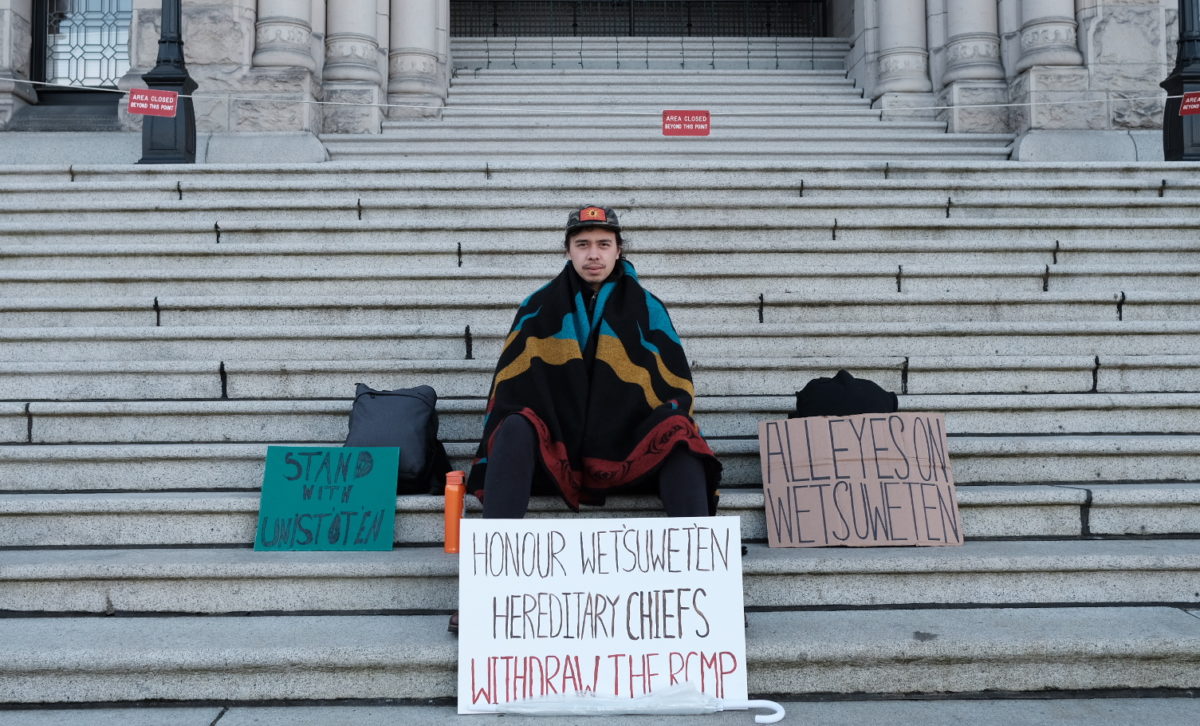
It’s 1997, and Art Wilson has work to do.
Art usually finds himself in the background, but the hereditary chiefs had recently called on the public to demonstrate why the land is theirs. Day and night, Kolin Sutherland-Wilson watches his father work on the front lines — setting up blockades, creating art, and raising money for the legal case.
13 years beforehand, the hereditary chiefs of both the Gitxsan and Wet’suwet’en nations filed a land title action with the Supreme Court of British Columbia. They claimed authority to over 58 000 km of land in northwestern B.C., and wanted to save their land from logging. The nations also wanted B.C. to recognize their title, and give any compensation for loss of their land.
The trial began with Elders from the Gitxsan and Wet’suwet’en using oral histories in their own language to describe why they own the land, but a B.C. Supreme Court judge ruled in 1991 that “any title the Gitxsan and Wet’suwet’en may have had was extinguished when British Columbia joined Confederation.”
The Gitxsan and Wet’suwet’en immediately challenged the B.C. Supreme Court’s ruling to the B.C. Court of Appeals, and while that court said the provincial government “has a duty” to consult with Indigenous peoples on projects that will impact their rights, they agreed that the Gitxsan and Wet’suwet’en did not hold title to their land.
It was not until 1997, following failed negotiations with the province, that the Supreme Court of Canada found B.C. had no right to extinguish the rights of Indigenous peoples to their traditional territory. It was made clear that it was the hereditary chiefs who have the authority and title over this land.
Kolin was four years old.
*
It’s now 2020, and as a natural introvert, Kolin would prefer to avoid the spotlight.
He describes himself as a “hermit,” and typically enjoys quiet time at home with his wife and cat. However, when he woke up last December and learned that the B.C. Supreme Court granted an injunction to stop Wet’suwet’en peoples and anti-pipeline protesters from blocking roads to a pipeline project on their traditional territory, he knew something had to be done.
After the hereditary chiefs called for a week of solidarity, Sutherland-Wilson decided to stage a solo week-long strike of his own outside the B.C. Legislature in support of the Wet’suwet’en peoples against the pipeline. He walked out during the first week of classes on Jan. 6 and was there from 9 a.m. to 5 p.m. every day of that week.
“Being from the Gitxsan nation, who are ancient allies of the Wet’suwet’en, I felt it was my duty to fully commit to what they were asking for,” says Sutherland-Wilson. “Because I myself belong to a hereditary system of governance, and anything that happens to them I know will happen to my people as well since we’re so intertwined.”
Sutherland-Wilson, an Indigenous Studies and Environmental Studies student at UVic, is from the village of Anspayaxw and was born into the Fireweed Clan of the Gitxsan nation in northwest B.C. He served as the Firekeeper (spokesperson) of UVic’s Native Students Union (NSU), began the “News Unsettled” column in the Martlet last year to pressure UVic to address the injustices committed against the Wet’suwet’en, Unist’ot’en, and Gidimt’en peoples, and currently serves as a Director-at-Large on the University of Victoria Student Society (UVSS) board.
Sitting in the NSU’s office in the basement of the Student Union Building, on an abnormally cold and snowy day in Victoria, Sutherland-Wilson gently clasps his hands together and stares straight ahead. The words “All Eyes on Wet’suwet’en” are written in big block letters on the whiteboard just over his right shoulder. He closes his chestnut-brown eyes for a few seconds, opening them to reveal weary tinges of red.
“Sitting on the steps was the least I could do, just to be a constant presence down there at the Legislature, just to be a constant reminder that what is happening is unacceptable and that B.C. has a duty to approach this nation-to-nation relationship in good faith and to not rely once again on the force of the RCMP like they did last year,” he says.
On Jan. 6, the first day of his week-long protest, Sutherland-Wilson published a video, “Colonialism in Canada: What is happening at Unist’ot’en?” to YouTube explaining the history of the Wet’suwet’en nation and why they continue to fight for their land.
In early January of 2019, the RCMP received international media coverage by arresting 14 people for preventing access to Coastal GasLink’s pipeline project in northwestern B.C. Coastal GasLink first launched its court case against protesters in Dec. 2018, before receiving an extended injunction this past December.
The company is owned by TC Energy, and has plans to build a 670-kilometre natural gas pipeline from northeastern B.C. to a liquefied natural gas plant that will be located in Kitimat, B.C. They have been clearing land in the province since last year to make room for this project.
Coastal GasLink has received approval from all 20 elected First Nations band councils on the pipeline’s proposed route; however, the hereditary chiefs in the Wet’suwet’en nation say those agreements don’t apply to their traditional land and oppose any construction without their approval.
In 2007, the United Nations Declaration on the Rights of Indigenous Peoples (UNDRIP), an act that outlines the framework of rights for Indigenous people across the world, was adopted by the General Assembly. Initially, Canada was one of four countries who voted against it, and the Trudeau government put forward a bill to adopt the UN declaration in 2016, but the bill failed.
B.C. also made history last October for becoming the first province to introduce legislation with the aim of implementing UNDRIP into law. Scott Fraser, Minister of Indigenous Relations and Reconciliation, said at the time that the legislation, known as Bill 41, is “about ending discrimination and conflict in our province, and instead ensuring more economic justice and fairness.”
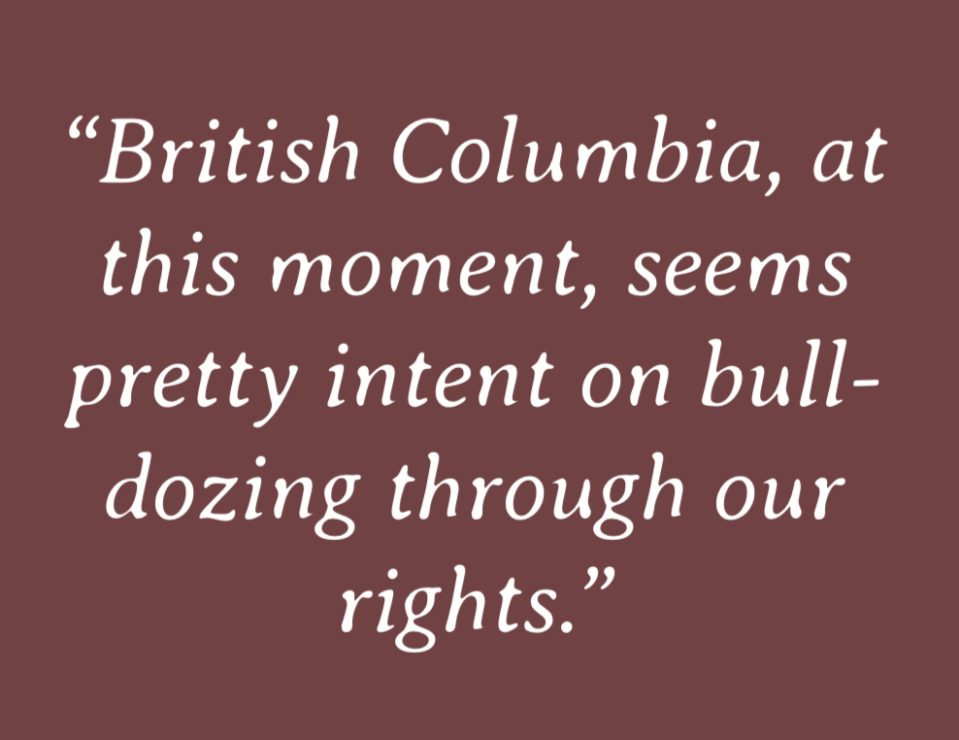
However, with hereditary chiefs of the Wet’suwet’en nations publishing a press release shortly after the B.C. Supreme court extended Coastal GasLink’s injunction in December, many opponents see it as hypocritical of the province to attempt to claim reconciliation with Indigenous groups while allowing major corporations to bulldoze through unceded territory.
“In this time of reconciliation, with B.C. being the first province to legislate [UNDRIP], this ruling by a court in B.C. against Indigenous rights and recognition truly proves that industry, not the people, can control the province and its laws,” said Dini’ze Na’moks of the Tsayu Clan in an interview with the CBC.
On Jan. 13, the Globe and Mail reported Premier John Horgan had “brushed aside” complaints from human-rights organizations such as the UN Committee for the Elimation of Racial Discrimination and B.C.’s independent Human Rights Commision who say the province needs to gain approval from all Indigenous peoples affected by the project, and instead declared the court’s ruling must be upheld and that the pipeline should be completed.
Sutherland-Wilson sees connections to the initial 1991 B.C. Supreme Court case that ruled the Gitxsan had no title to their land after the province joined confederation. Even after they won an appeal in the Supreme Court of Canada, he says it’s disheartening to see the country continue to brush off and neglect the decisions of the hereditary chiefs.
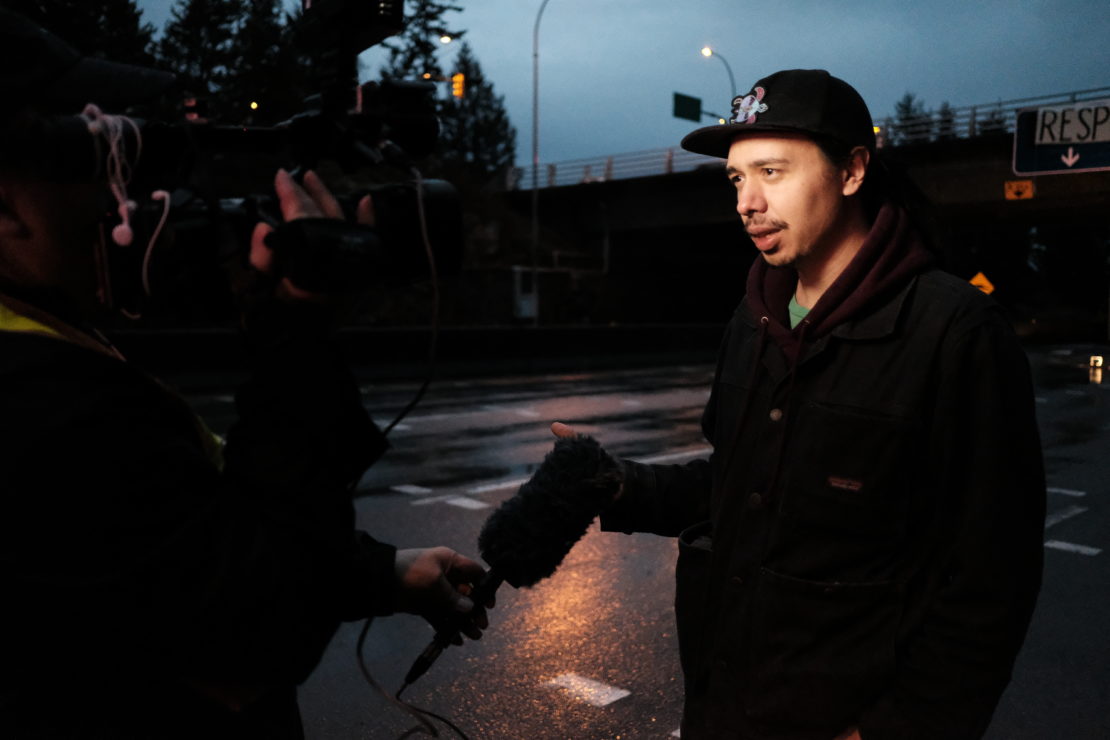
“You look at this most recent British Columbia Supreme Court decision, and they seem to completely ignore that history. They completely ignored that discussion regarding rights and title that we won in the previous case … British Columbia, at this moment, seems pretty intent on bulldozing through our rights,” he says.
“It’s pretty easy to understand that British Columbia is in the wrong here. That the hereditary chiefs are not only standing up for their land, but their culture, language, and identity. It’s a whole way of life, and for British Columbia to try to make that a criminal offence, to stand up for our way of life, that flies in the face of all their rhetoric and reconciliation.”
*
It’s the final weekday of his week-long protest at the Legislature, and Kolin is sitting on the front steps.
The weather is cold, and he’s there day until night, but it’s nothing compared to the snow, ice, and freezing temperatures that protesters are facing on Wet’suwet’en territory in northwestern B.C.
Hundreds of UVic students walked out of class on Jan. 10 to stand in solidarity with Sutherland-Wilson and the hereditary chiefs. They marched around Ring Road and met Kolin at the Legislature with signs and banners — shocking the student who originally planned to just be a single constant presence at the provincial building.
“When everyone came down and joined me at the Legislature,” he says before pausing and recollecting the moment. Sutherland-Wilson tears apart his hands from a clasped position, and begins to rub them along the length of his thighs.
“Just the fact they went down there to join me, and stand in solidarity with the Wet’suwet’en … I think it really helped me fully communicate my purpose for being down there.”
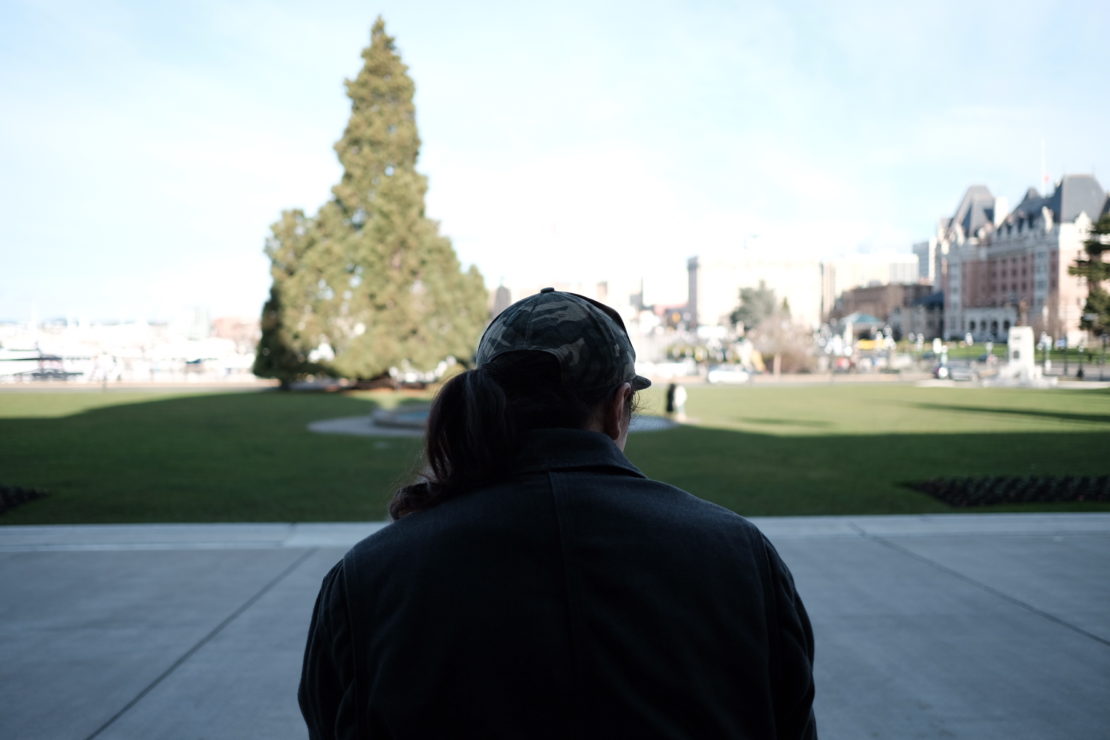
He says a lot of his knowledge comes from his father and Elders in his home community, the same people who have been fighting this same struggle for generations.
It’s tiring and cold sitting on the steps of the Legislature for hours and hours on end, but Sutherland-Wilson says it’s his duty to follow his heart.
“Lives are on the line, people I love and know,” He says. “I don’t really have a choice but to make as much noise as possible, to try and get as much information out there as possible.”
There’s probably a million other places he would be — including quiet time at home with his wife and cat — but, like his father over two decades ago, he knows there’s still work that needs to be done.
To watch Kolin’s video on YouTube about the history of the Wet’suwet’en nation, and the protests, visit the “Colonialism in Canada” YouTube page or click on this link.



